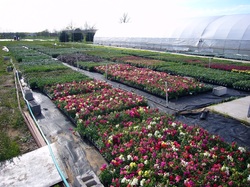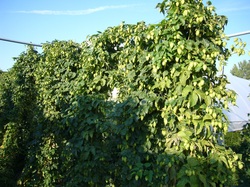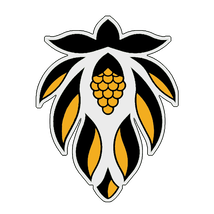|
I constantly wonder what drives this craft brewing revival. Is it just a re-discovery by a new generation - " something old is now is something new"? Is it a inner compulsion to create something that you can take pride in - "I made that"? Is it that desire of little boys to get that mad scientist chemistry set - (and being brave enough to drink the resulting concoction)? What ever it is, it is not a bunch of cheap drunks - in fact the level of sophistication amazes me. This "trend" seems to be no flash in the pan, and you can quickly see that just by looking at the drop in the big brewers sales numbers. The number of craft brewers is expanding rapidly. Unfortunately, along with all interest in brewing, a few bad things have popped up along the way and you should be aware of them. One of the biggest IMHO is "hop plants for sale"- the topic of this blog. This crazy rush of of what I call brewers frenzy has created a haphazard conglomeration of hop seed, plant, and rhizome resellers via the Internet. Everybody wants to cash in - but there are no rules or standards, and there are no "Plant Police". A major issue is that there are hundreds of beer hop cultivers grown, but most are indistinguishable from each other. There are relatively few actual producers of hop rhizomes, fewer yet who grow the hop plants, and very few who certify what they sell; and almost nobody propagates virus indexed stock with proven identities. This has resulted in a "wild-west" market of hop plant material that has no standards for true identification or disease. (Basically, there are a lot of people out there selling mutts as pedigreed hounds.)  Case in point : This season I wanted to compare what we do at Great Lakes Hops with our Internet- based competitors. I ordered a similar selection of hop rhizomes from as many places as I could find. The goal was to compare service, quality, and value of purchase. I made 4 purchases from re-sellers, 3 from grower/ producers in February and waited. All were prepay, I had no problem with that, but a couple of orders didn't show til late May, and the last one showed up in mid June. What I received for the money spent did not impress me. The grower/producer rhizomes were the quickest to arrive and were by far the best quality. The ones associated with the National Clean Plant Program were the best. The resellers rhizomes arrived - many were shrivelled, moldy and dry. They looked like they had been stored for a long period, and some obviously had been cut in half! Many of these had no buds showing - resembling little dead sticks. At $4.50 each, they were no deal. The hop plants arrived last - 3" high, single stem plants at $10 dollars each. Pretty expensive, but they had varieties the others did not have. However, all the soil had shaken off the roots and the plants were not looking good.  I am a professional Horticulturist with 25 years in the plant growing business and I receive plant material from literally world-wide. Many are cuttings of plants with no roots at all when I receive them. IMHO, if anyone had a good chance of starting these, it should be me. I planted them out as they came in; putting the Cascades next to Cascades, Fuggle next to Fuggle, Chinook next to Chinook - you get the picture. The direct producer plant material came up pretty reliably; the resellers rhizomes were weak and only about 3/4ths ever emerged. The little plants pretty much stalled out in the heat of July and stared back at me. But I was okay with that - I just wish they had arrived earlier! But what developed with the rhizomes as the season progressed really surprised me. I started noticing differences - One Cascade didn't look like the others, Centennials had dark leaf types and light green leaf types, the Fuggles all grew differently, the Magnum from one place has green stems, and from the other place had red stems, Kent Golding was healthy or sickly. What was going on? This started out as a simple competitors check, but some thing else was going on. So I decided to plant them out alongside our test plot and compare them to our stock plants as they grew side by side. (I should have taken pictures.) I have watched them all summer and have two basic conclusions. Number 1:BEWARE! A lot of these plants are not the varieties they claim to be! Apparently, somebody out there is just throwing rhizomes in a bag and are calling them whatever, just to get the money. Number 2: There is a lot of diseased junk out there. Lack of plant vigor and virus expression in the hop leaves was common. Only the rhizomes direct from grower/producers were comparable to our virus indexed stock.  I feel pretty good about what what we do at Great Lakes Hops. I am trying to supply healthy Hop plants that adhere to the National Clean Plant Standards. I am not trying to sell you here, but please consider your source carefully before you purchase hop plants or rhizomes. You can't grow healthy hops and brew a great beer if you start with junk! Brew on! |
Details
Blog AuthorLynn, the head hop grower at Great Lakes Hops has over 30 years of experience in the horticultural field. Browse the blog articles here to find useful growing information for humulus lupulus, based on personal experience and observations at Great Lakes Hops. Archives
January 2020
Categories
All
|


 RSS Feed
RSS Feed